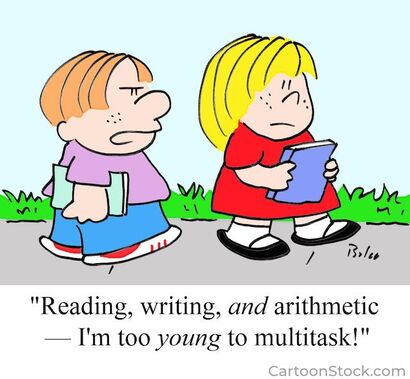|
Douglas Silas,
Specialist SEN Solicitor 31st January 2022
In this week's SEN Update (apart from my: 'Thought Of The Week'), you will find sections entitled:
I know how busy everyone always is, so please feel free just to read the sections that are of interest to you or read everything; the choice is always yours.
THOUGHT OF THE WEEK
Unfortunately, many people tend to think that there is only one type of intelligence in life - IQ, which stands for and is measured by ‘Intelligence Quotient’. However, there are actually two main types of intelligence, as the other is EQ - which stands for and is measured by ‘Emotional Quotient’. IQ is the type of intellectual or academic intelligence which makes people seem clever to us. Although having a high IQ is usually an indicator that someone has more chance of getting somewhere in life, I have found that, in fact, you need to be intelligent both intellectually and emotionally, to get by properly. Intellectual intelligence is not the same as emotional intelligence. Emotional intelligence is often defined as having an ability to perceive, use, understand, manage and handle emotions. People with a high EQ recognise their own emotions, as well as those in others. They also use emotional information to guide their thinking and behaviour, or to distinguish between different feelings and can adjust their emotions to adapt to differing environments or people. Think about it, if an average IQ is 100, a high IQ is 120 and a low IQ is 80, if we then say that an average EQ is 100, a high EQ is 120 and a low EQ is 80, we then find that, although somebody with a high IQ of 120 may seem more advanced, if they have a low EQ of 80, their average is 100 and the same thing goes for somebody with a high EQ and low IQ - they both come out as just average. The trick is to not only have one sort of intelligence of IQ, but to try and have both a high IQ and EQ, so that you are more balanced. In fact, if you extrapolate that, to be successful both intellectually (academically) and emotionally (functionally), you can have just a slightly higher IQ and EQ, as your average of both may then be higher, as only being strong in one may even sometimes hold you back a bit. Also, I have seen that people with a high IQ often (usually unconsciously) make other people around them feel bad about themselves, as others feel intimidated, or even stupid around them. However, people with a high EQ often make other people around them feel good about themselves, by being positive, or pointing out things that they have noticed in them that they themselves may not have noticed. And sorry to be scrambling a bit with your brain this week, but there are actually three more types of intelligence that you need to be aware of: ‘Practical’, ‘Creative’, and ‘Analytical’. Practical intelligence is an ability to deal with daily tasks in the real world and is often compared to being “streetwise’. Being practical means you find solutions in everyday life using knowledge based on experiences. Like when successful people who have dropped out of school/college say that, although they do not have academic qualifications, they have got a degree from the ‘University of Life’ Creative intelligence is an ability to solve problems by imagining new and unique solutions. It is associated with people who have a knack for storytelling, art, and developing new ideas, or the ability to deal with new and unusual situations. . For example, creative intelligence would be involved when using your imagination to write a story, paint, or create something else. Analytical intelligence refers to a person's ability to problem-solve, perform academic tasks, process information, and employ abstract reasoning. I guess it is similar to IQ, as it refers to the ability to complete academic and traditional intelligence tests. However, it is slightly different. Think of it like this: 1) Intellectual intelligence: your ability to learn academically; 2) Emotional intelligence: your ability to understand and use feelings; 3) Practical intelligence: your ability to function in the real world; 4) Creative intelligence: your ability to come up with new ideas.; 5) Analytical intelligence: your ability to evaluate and solve problems. So, this week, look at people again and don’t only see them as intelligent intellectually, but also emotionally, practically, creatively or analytically. You may be surprised when you reframe things, as people you thought clever intellectually, may be not intelligent in other ways, but someone you thought not clever intellectually, may be quite intelligent in other ways!
SEN NEWS
Nothing really for me to report on in SEN News this time. I really struggle sometimes to find things that are worthy of bringing to people's attention, as I do not want to unnecessarily take up their precious time with something, just for the sake of it, so please forgive me not highlighting anything here this week.
NEWS ONLINE
In terms of news, here are the articles that I found of interest this week: One in eight pupils out of school as Covid worsens Up to 10,000 pupils in England missed whole autumn term last year, analysis finds
USEFUL INFORMATION
Again, aside from clicking on the relevant links for more information, I would also remind you of the very useful resources and information provided on the following websites: - IPSEA - Council for Disabled Children - Special Needs Jungle I would also highlight again the magazines: SEN Magazine and Autism Eye which are both very helpful to any parents or professionals involved with children/young people with SEN. With best wishes Douglas
P.S. Don’t forget, to ensure that you never miss one, you can get my SEN Updates personally by completing your email details above, or by following me on one of the social media platforms I use (i.e. Twitter/Facebook).
P.P.S. You can also share this SEN Update with others (please only do so if it may be relevant to them) by using one of the icons, usually to the right or at the bottom of this page.
How useful do you find my SEN Updates?
Created with Quiz Maker
Douglas Silas,
Specialist SEN Solicitor 24th January 2022
In this week's SEN Update (apart from my: 'Thought Of The Week'), you will find sections entitled:
I know how busy everyone always is, so please feel free just to read the sections that are of interest to you or read everything; the choice is always yours.
THOUGHT OF THE WEEK
A lot of people talk about ‘multi-tasking’, both in a good and bad way. Today, I want to talk about this a bit and, as ever, try to get you to see things from a slightly different perspective. Some people say that there is no such thing as ‘multi-tasking’ and then like to point out that, according to scientific studies, you can theoretically only do one thing properly at one time. Others like to argue though that ‘multi-tasking’ is actually their practical reality everyday and something that they always have to do to just keep things going and keep all their plates spinning in the air (think of a circus performer). Personally, I have found that, actually, both of these things are true, but also neither are true - another paradox I am afraid! In reality, multi-tasking is really just task-switching, as I agree that you can usually only do one thing well at once. But I have also found that, both theoretically and practically, you can actually also do two things at once, by focusing on doing one thing actively in the foreground and by also doing another thing passively in the background. For example, you can both ‘listen’ and ‘hear’ at the same time, by ‘listening’ actively to something in the foreground, but ‘hearing’ more passively in the background to what is going on around you. Of course, you can always then switch your attention to something in the background and bring it to the foreground, if necessary. In fact, I think that we unconsciously and naturally do this all the time. Think of listening to music passively in the background, whilst doing something actively in the foreground. Or, as parents of young children often say, focusing on doing something actively in the foreground, whilst still listening to their children passively in the background, to ensure that they are alright. In fact, this principle also applies more generally, if you are walking, running or doing something outdoors. Another example, and maybe one of the best ways to illustrate this principle, is to carefully watch a martial artist, who seems to be successfully fighting six people simultaneously. When you really look at them though, they are actually only fighting one person at a time so, effectively, only doing one thing well at once. However, our brain then tricks us into thinking that they are fighting everyone at the same time. Unfortunately, this is also the same brain that tricks us into believing that we can also do more than one thing at once. This is not really so. In fact, I often like to joke that, whilst some people say that they can multi-task well, they actually may sometimes not do everything that they are doing as well as they can, or they may just start a lot of things but then not properly finish them! I have also found that, practically, whilst you may then think that you should only do one thing at a time to be able to do it as well as you can and then focus all your energies on it, I am afraid that we also live in a practical world, where we often have to do more than one thing at once. Therefore this idea of foreground and background tasking is quite important to try and understand and become used to, if you can. Think about it, if you only do one thing at a time, you may be able to give it 100% of your focus and energies, whereas if you try to do two things at a time, you may only be able to give them both about 50% each; whereas if you actively do one thing in the foreground, you can still give it 100% and if you do another thing in the background, but have it there ready to switch to if you need to, then it doesn’t take up any more of your focus or energies until it needs to. If you do follow this idea (you will need to try it a few times before you get it right), you will also end up being able to do two things at once, or do the same thing in half the time. With practice, it almost feels like you are getting yourself more time in your day! So, this week, try thinking about what I have said above and focusing on just doing one thing at a time actively in the foreground, whilst doing something else more passively in the background - you also may get twice as much done in the same time, or do something in half the time!
SEN NEWS
Not much to report on in SEN News again this week. Although one thing caught my eye again - a tweet by the Disabled Children's Partnership (DCP), which stated: "CountDisabledChildrenIn calls on local councils to invest in the services that disabled children and families deserve as they set their budgets for the next year. Email your council leader http://Bit.ly/DCPCountDisablntDisabledChildrenIn"
NEWS ONLINE
In terms of news, here are the articles that I found of interest this week: Covid in schools: Inquiry launched to find 100,000 pupils absent in England Masks to stay in many secondary schools despite England rule change Boris Johnson tells schools in England to end mask-wearing policy
USEFUL INFORMATION
Again, aside from clicking on the relevant links for more information, I would also remind you of the very useful resources and information provided on the following websites: - IPSEA - Council for Disabled Children - Special Needs Jungle I would also highlight again the magazines: SEN Magazine and Autism Eye which are both very helpful to any parents or professionals involved with children/young people with SEN. With best wishes Douglas
P.S. Don’t forget, to ensure that you never miss one, you can get my SEN Updates personally by completing your email details above, or by following me on one of the social media platforms I use (i.e. Twitter/Facebook).
P.P.S. You can also share this SEN Update with others (please only do so if it may be relevant to them) by using one of the icons, usually to the right or at the bottom of this page.
How useful do you find my SEN Updates?
Created with Quiz Maker
Douglas Silas,
Specialist SEN Solicitor 17th January 2022
In this week's SEN Update (apart from my: 'Thought Of The Week'), you will find sections entitled:
I know how busy everyone always is, so please feel free just to read the sections that are of interest to you or read everything; the choice is always yours.
THOUGHT OF THE WEEK
We so often get so stuck and waste so much of our time worrying about the past, that we sometimes forget to make the most of the present, or to look to the future. In reality, we want to look back fondly on life and remember good things, not bad things. However, not all things that we remember that we have done are good things. We may regret them. Yet, as I have said before, it is actually mistakes that we make, or things that we regret, that we actually learn from, or that we have to go through to become who we are, even if we would have preferred to do so otherwise. Ironically, these experiences are usually quite positive for us in the long run, as we can often then take away something naturally from them and, provided that we have learned from them, if getting something wrong, we may then be able to use them as learning experiences later on in our lives in other similar situations, even within a different context. I heard someone say once that, on the basis that we have a lifespan of about 80 years, we only have about 4000 weeks of life. So therefore, using logic, if we are already 20 years old, we only have 3000 weeks left, if are already 30 years old, we only have 2500 weeks left and, if we are already 40 years old, we then only have 2000 weeks left to go and and that number is forever dwindling. Chilling isn’t it, when you put it like that? I also heard it said by someone else that we generate all our cells afresh every 7 years, so therefore we are then theoretically a new person every 7 years. Therefore, we should remind ourselves that, practically again using logic, what we did 10 years ago was done by one earlier version ago of ourselves, but something that we did about 20 years ago was actually done by someone almost three earlier versions ago of us! Additionally, do not mix up positive and negative thinking about things that might have happened to you in the past as, if you do this, you may only confuse yourself, as the bad will always seem to outweigh the good, even though that it may not actually be that way in reality. This principle so often applies to so many things we encounter, where one small bad thing always outweighs the many good things that there are. Think of it like putting only a single small drop of coloured dye into a large bucket of clear water. Although there is far more clear water, the dye always spreads completely and tinges everything. Another example is how, out of 100 people, 99 people think of us in a positive way, but if one person thinks of us in a negative way, we focus on that and then ignore the 99 people who think positively of us. It just doesn’t make sense! You cannot help thoughts springing into your head, but you can choose whether or not they stay there and whether you listen to them or not. I also heard someone say once that you should gently let negative thoughts come into but then also go out of your mind, in the same way as somebody goes through a revolving door at the front of a hotel - they just come in, go around and then go out again. So, this week, try not to get stuck in the past or, if you do, try to think of any mistakes that you have made as positively as possible and as just learning experiences that help you in the future. Also, this week, try to think about the importance of using your remaining time of what is left in life as well and positively as possible.
SEN NEWS
Not much to report on in SEN News this week. Although one thing caught my eye - a Government consultation entitled: 'Keeping children safe in education: proposed revisions 2022'.
NEWS ONLINE
In terms of news, here are the articles that I found of interest this week: Schools struggle amid Covid as one in 12 teachers off Nurseries in England hit by staff absences after soaring Covid cases Covid in nurseries: Staff shortages 'mentally exhausting'
USEFUL INFORMATION
Again, aside from clicking on the relevant links for more information, I would also remind you of the very useful resources and information provided on the following websites: - IPSEA - Council for Disabled Children - Special Needs Jungle I would also highlight again the magazines: SEN Magazine and Autism Eye which are both very helpful to any parents or professionals involved with children/young people with SEN. With best wishes Douglas
P.S. Don’t forget, to ensure that you never miss one, you can get my SEN Updates personally by completing your email details above, or by following me on one of the social media platforms I use (i.e. Twitter/Facebook).
P.P.S. You can also share this SEN Update with others (please only do so if it may be relevant to them) by using one of the icons, usually to the right or at the bottom of this page.
How useful do you find my SEN Updates?
Created with Quiz Maker
Douglas Silas,
Specialist SEN Solicitor 10th January 2022
In this week's SEN Update (apart from my: 'Thought Of The Week'), you will find sections entitled:
I know how busy everyone always is, so please feel free just to read the sections that are of interest to you or read everything; the choice is always yours.
THOUGHT OF THE WEEK
Conflict is actually very normal, as it is almost ludicrous to truly believe that everybody will always think the same as you - much as you would like them to! Yet most people believe that conflict never solves or resolves anything and therefore should always try and be avoided by us most of the time, at all cost. However, conflict (or at least some form of disagreement) is often inevitable and, ironically, sometimes you can look at conflict positively. The reason is that it is often really about how you deal with that conflict - constructively or destructively. To properly solve a conflict, you really have to go beyond the conflict itself and instead try and get to real communication, where you actually ultimately listen to another person with differing views to you and, if you cannot initially resolve your differences, take a break and try again later, without demonising the other person. We need to try to always see things from another person’s perspective first. Too often we are very polarised in our views so that, if we do not agree with someone, we instantly dismiss them unconsciously (or even consciously) as ‘stupid’. Unfortunately, especially during recent years, there seems to be only talking, but no listening anymore. We also seem to have a mindset where now, not only must someone ‘win’, but the other person must also ‘lose’! However, logically, we don’t like it if they do the same to us - so we can’t have it both ways! And you don’t have to necessarily agree with someone to have a peaceable relationship with them. We should be aiming for ‘win/win’, where both people genuinely feel they have won something, as now it is more like ‘lose’/‘lose’, because people cannot respectfully just agree to disagree. You may also find that some people say or do things that are often conflicting, but that they do not seem to realise that they are acting in a contradictory or hypocritical manner. In fact, I have found that people who do this are also usually the quite clever people, who always seem to have an answer for everything and will try to cleverly rationalise what they have said or done. In order to resolve conflict peaceably and positively, you also need to show the other person that you are working hard to understand them, or to see their point of view and, in this way, are trying to resolve a conflict. You do this by saying things like: ‘Please help me understand you’ and then fully listening to them explain their view, no matter how hard it is to hear, or how wrong you think they are. You do not have to agree with someone, but you do need to listen to them. Also, you cannot change what has happened in the past, you can only do things differently for the future. Of course, all of the above also works the other way around and, if you do listen to them, then you will also be able to point out to them later if they try to not hear you, that they should also listen to you! We also need to, metaphorically, press the ‘pause’ button before we respond to them or do anything. A lot of the time, what they say just makes us angry, but as Thomas Jefferson once said, if you are angry you should count to 10 before you say anything or respond to something, but if you are very angry, you should first count to 100 ! So, this week, as strange as it may seem for me to say, try to look on your conflicts with other people as opportunities for you to positively resolve them. You may actually then find that doing things this way helps make you a better person, or reach a better place!
SEN NEWS
A New Year and it's time for more Government guidance! Again, it's in three parts (there may be more which I'm unaware of), as follows: - Schools COVID-19 operational guidance (January 2022) - SEND and specialist settings: additional COVID-19 operational guidance (January 2022) - Evidence Summary: Coronavirus (COVID-19) and the use of face coverings in education settings (January 2022)
NEWS ONLINE
In terms of news, here are the articles that I found of interest this week: Pupils return to Covid testing and masks in class Schools in England may suspend certain subjects to cope with Covid Covid: Face mask refusals in some of England's secondary schools spark parents' concern
USEFUL INFORMATION
Again, aside from clicking on the relevant links for more information, I would also remind you of the very useful resources and information provided on the following websites: - IPSEA - Council for Disabled Children - Special Needs Jungle I would also highlight again the magazines: SEN Magazine and Autism Eye which are both very helpful to any parents or professionals involved with children/young people with SEN. With best wishes Douglas
P.S. Don’t forget, to ensure that you never miss one, you can get my SEN Updates personally by completing your email details above, or by following me on one of the social media platforms I use (i.e. Twitter/Facebook).
P.P.S. You can also share this SEN Update with others (please only do so if it may be relevant to them) by using one of the icons, usually to the right or at the bottom of this page.
How useful do you find my SEN Updates?
Created with Quiz Maker
|
Archive
March 2022
|
© Douglas Silas Solicitors 2005-24
Authorised and Regulated by the Solicitors Regulation Authority (SRA no: 643718)
‘Douglas Silas Solicitors’ is the trading name of ‘Douglas Silas Solicitors Limited’, a limited company registered in England & Wales (company no: 10689991), whose registered office is Gable House, 239 Regents Park Road, Finchley, London, United Kingdom, N3 3LF. A list of members/directors may be inspected at our office.
Authorised and Regulated by the Solicitors Regulation Authority (SRA no: 643718)
‘Douglas Silas Solicitors’ is the trading name of ‘Douglas Silas Solicitors Limited’, a limited company registered in England & Wales (company no: 10689991), whose registered office is Gable House, 239 Regents Park Road, Finchley, London, United Kingdom, N3 3LF. A list of members/directors may be inspected at our office.

















 RSS Feed
RSS Feed







